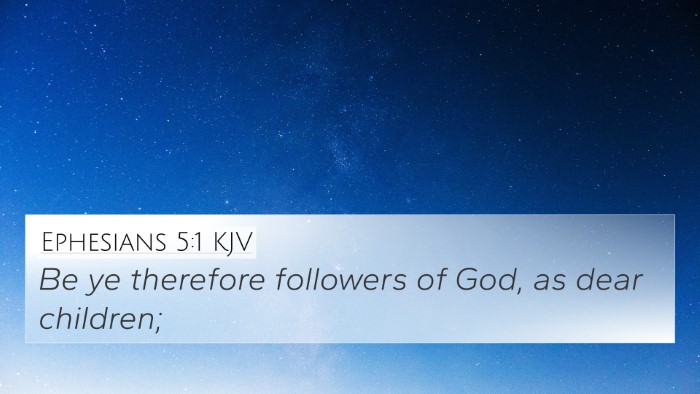Bible Verse: Luke 6:36
"Be ye therefore merciful, as your Father also is merciful."
This verse encapsulates the call for Christians to embody mercy, reflecting the nature of God as merciful. Below is a synthesis of insights drawn from public domain commentaries, providing a comprehensive understanding of this scripture.
Meaning and Interpretation
Luke 6:36 serves as a profound reminder of the character of God and our response to His mercy. The call to "be merciful" indicates a direct invitation to live out the very attributes of God in our personal conduct. Here are key insights drawn from renowned commentaries:
- Matthew Henry: Henry emphasizes that mercy is not simply an act, but a disposition of the heart. He views mercy as the fruit of compassion, urging believers to extend grace and forgiveness as God does.
- Albert Barnes: Barnes points out that this verse forms part of the larger teaching known as the Sermon on the Mount, where Jesus describes the attitudes that should characterize His followers. He notes the interrelation of mercy with forgiveness and how it reflects a follower's understanding of God's grace.
- Adam Clarke: Clarke elaborates that being merciful means having an active concern for the welfare of others. He explains that true mercy involves both emotional empathy and tangible support for those in need.
Connections with Other Scripture
Luke 6:36 resonates deeply with numerous other biblical texts, illustrating the consistency of God's message regarding mercy and compassion. Here are some pertinent cross-references:
- Matthew 5:7: "Blessed are the merciful: for they shall obtain mercy." This beatitude reinforces the reciprocal nature of mercy.
- James 2:13: "For he shall have judgment without mercy, that hath showed no mercy; and mercy rejoiceth against judgment." This highlights the critical importance of mercy in judgment.
- Colossians 3:12: "Put on therefore, as the elect of God, holy and beloved, bowels of mercies, kindness, humbleness of mind, meekness, longsuffering." This verse calls for the practice of mercy among believers.
- 1 Peter 3:8: "Finally, be ye all of one mind, having compassion one of another, love as brethren, be pitiful, be courteous." Peter encourages a community reflecting God's compassion.
- Micah 6:8: "He hath shewed thee, O man, what is good; and what doth the Lord require of thee, but to do justly, and to love mercy, and to walk humbly with thy God?" This Old Testament teaching anchors the concept of mercy in God's expectations.
- Luke 10:37: In the parable of the Good Samaritan, Jesus emphasizes that the one who shows mercy is the true neighbor, promoting an active expression of mercy in our lives.
- Romans 12:1: "I beseech you therefore, brethren, by the mercies of God, that ye present your bodies a living sacrifice, holy, acceptable unto God, which is your reasonable service." Paul underscores mercy as the basis for our service to God.
Thematic Connections and Reflections
The themes of mercy and compassion permeate the Scriptures, presenting a unified message. Understanding Luke 6:36 within this context encourages believers to reflect on their own actions and attitudes:
- The Nature of God: Recognizing God's mercy prompts believers to imitate His character in their interactions with others.
- Reciprocal Blessing: The beatitude in Matthew suggests that showing mercy may lead to experiencing mercy ourselves, enriching our spiritual lives.
- Living Faith: True faith manifests in acts of mercy, aligning with the teachings of both the Law and the Gospel.
Practical Application
To embody the message of Luke 6:36, believers are encouraged to:
- Practice Forgiveness: Reflect on personal struggles with forgiveness and seek to extend grace to those who have wronged you.
- Engage in Acts of Kindness: Look for opportunities to assist those in need, both physically and emotionally, in your community.
- Develop a Merciful Heart: Cultivate empathy through prayer, asking God to soften your heart towards others and to identify specific people you can show mercy to.
Cross-Referencing for Deeper Understanding
Utilizing tools for Bible cross-referencing can deepen one's understanding of Luke 6:36. Here are some recommended practices:
- Use a Bible concordance to locate verses related to mercy and compassion, enhancing your study of interconnected themes.
- Engage in a cross-reference Bible study, comparing passages to see how different authors address similar themes.
- Develop skills in cross-referencing Bible study methods to connect teachings across both the Old and New Testaments effectively.
Conclusion
Luke 6:36 encapsulates a fundamental principle of Christianity: to be merciful as God is merciful. By exploring the connections between this verse and others, we gain a richer understanding of God’s call to reflect His character in our lives. Embracing mercy transforms both our hearts and communities, aligning us closer to God’s desires for humanity.






